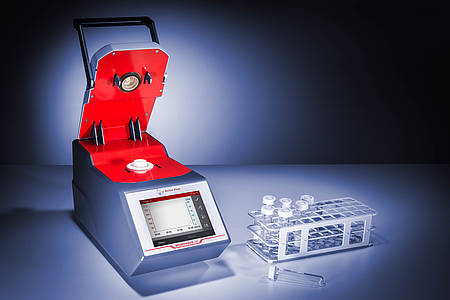Die Beschleunigung chemischer Reaktionen spart neben Zeit auch Geld, was nicht nur Ausbildungsstätten und Universitäten, sondern auch der chemischen Industrie wesentliche Vorteile bringt. Univ.-Prof. Dr. C. Oliver Kappe und seinem Team am Institut für Chemie der Karl-Franzens-Universität Graz ist es als Vorreiter auf dem Gebiet der Mikrowellenchemie gelungen, durch schnelles und extrem hohes Erhitzen Reaktionszeiten enorm zu verkürzen. Vor einigen Jahren konnten die Grazer ForscherInnen nachweisen, dass nicht die elektrischen Felder der Mikrowelle für die Beschleunigung der Reaktionen verantwortlich sind, sondern ausschließlich ein Temperatureffekt. Vor Kurzem fanden die WissenschafterInnen eine technische Lösung, Reaktionsgemische auch ohne Mikrowelle ebenso rasch extrem hoch zu erhitzen. Auf Basis dieser Forschungen hat nun die Firma Anton Paar einen vollkommen neuartigen Synthesereaktor auf den Markt gebracht: Der Monowave50 arbeitet effizient, ist einfach und sicher in der Bedienung, kostengünstig, spart Platz und Energie und ist somit perfekt geeignet für die Ausbildung der Studierenden.
Das Funktionsprinzip gleicht dem eines Druckkochtopfs: Das Reaktionsgemisch befindet sich in einem geschlossenen Glasgefäß mit einer Silikonkappe in einem Edelstahlmantel. Das rasche Aufheizen erfolgt mittels Strom, in wenigen Minuten sind Temperaturen bis 250 Grad Celsius erreicht. Die integrierte Temperatur- und Druckmessung ermöglicht eine präzise Reaktionskontrolle und erhöht somit die Reproduzierbarkeit.
Der Synthesereaktor Monowave50 ist ein weiteres Top-Produkt, das aus der seit 2003 bestehenden Kooperation der Arbeitsgruppe von C. Oliver Kappe und der Firma Anton Paar hervorgegangen ist. Von 2007 bis 2013 war Anton Paar ein Unternehmenspartner im Christian Doppler Labor für Mikrowellenchemie an der Karl-Franzens-Universität Graz.
